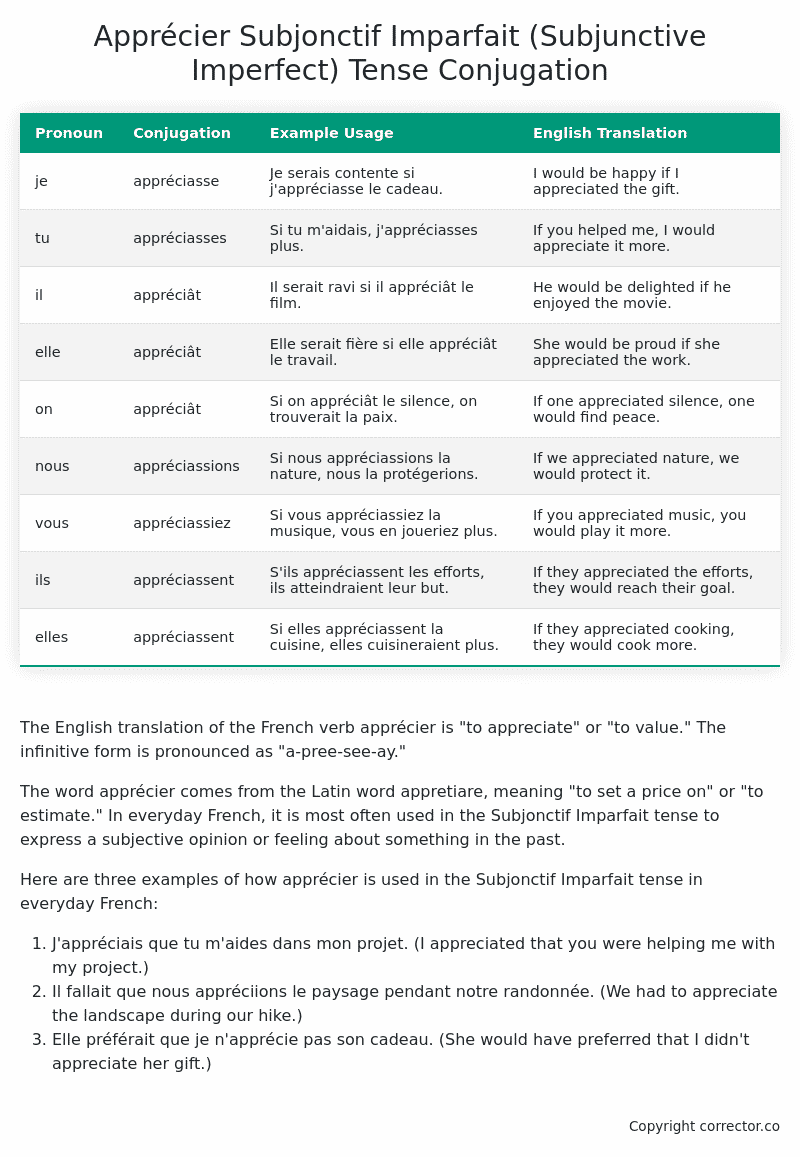Subjonctif Imparfait (Subjunctive Imperfect) Tense Conjugation of the French Verb apprécier
Introduction to the verb apprécier
The English translation of the French verb apprécier is “to appreciate” or “to value.” The infinitive form is pronounced as “a-pree-see-ay.”
The word apprécier comes from the Latin word appretiare, meaning “to set a price on” or “to estimate.” In everyday French, it is most often used in the Subjonctif Imparfait tense to express a subjective opinion or feeling about something in the past.
Here are three examples of how apprécier is used in the Subjonctif Imparfait tense in everyday French:
- J’appréciais que tu m’aides dans mon projet. (I appreciated that you were helping me with my project.)
- Il fallait que nous appréciions le paysage pendant notre randonnée. (We had to appreciate the landscape during our hike.)
- Elle préférait que je n’apprécie pas son cadeau. (She would have preferred that I didn’t appreciate her gift.)
Table of the Subjonctif Imparfait (Subjunctive Imperfect) Tense Conjugation of apprécier
| Pronoun | Conjugation | Example Usage | English Translation |
|---|---|---|---|
| je | appréciasse | Je serais contente si j’appréciasse le cadeau. | I would be happy if I appreciated the gift. |
| tu | appréciasses | Si tu m’aidais, j’appréciasses plus. | If you helped me, I would appreciate it more. |
| il | appréciât | Il serait ravi si il appréciât le film. | He would be delighted if he enjoyed the movie. |
| elle | appréciât | Elle serait fière si elle appréciât le travail. | She would be proud if she appreciated the work. |
| on | appréciât | Si on appréciât le silence, on trouverait la paix. | If one appreciated silence, one would find peace. |
| nous | appréciassions | Si nous appréciassions la nature, nous la protégerions. | If we appreciated nature, we would protect it. |
| vous | appréciassiez | Si vous appréciassiez la musique, vous en joueriez plus. | If you appreciated music, you would play it more. |
| ils | appréciassent | S’ils appréciassent les efforts, ils atteindraient leur but. | If they appreciated the efforts, they would reach their goal. |
| elles | appréciassent | Si elles appréciassent la cuisine, elles cuisineraient plus. | If they appreciated cooking, they would cook more. |
Other Conjugations for Apprécier.
Le Present (Present Tense) Conjugation of the French Verb apprécier
Imparfait (Imperfect) Tense Conjugation of the French Verb apprécier
Passé Simple (Simple Past) Tense Conjugation of the French Verb apprécier
Passé Composé (Present Perfect) Tense Conjugation of the French Verb apprécier
Futur Simple (Simple Future) Tense Conjugation of the French Verb apprécier
Futur Proche (Near Future) Tense Conjugation of the French Verb apprécier
Plus-que-parfait (Pluperfect) Tense Conjugation of the French Verb apprécier
Passé Antérieur (Past Anterior) Tense Conjugation of the French Verb apprécier
Futur Antérieur (Future Anterior) Tense Conjugation of the French Verb apprécier
Subjonctif Présent (Subjunctive Present) Tense Conjugation of the French Verb apprécier
Subjonctif Passé (Subjunctive Past) Tense Conjugation of the French Verb apprécier
Subjonctif Imparfait (Subjunctive Imperfect) Tense Conjugation of the French Verb apprécier (this article)
Subjonctif Plus-que-parfait (Subjunctive Pluperfect) Tense Conjugation of the French Verb apprécier
Conditionnel Présent (Conditional Present) Tense Conjugation of the French Verb apprécier
Conditionnel Passé (Conditional Past) Tense Conjugation of the French Verb apprécier
L’impératif Présent (Imperative Present) Tense Conjugation of the French Verb apprécier
L’infinitif Présent (Infinitive Present) Tense Conjugation of the French Verb apprécier
Struggling with French verbs or the language in general? Why not use our free French Grammar Checker – no registration required!
Get a FREE Download Study Sheet of this Conjugation 🔥
Simply right click the image below, click “save image” and get your free reference for the apprécier Subjonctif Imparfait tense conjugation!

Apprécier – About the French Subjonctif Imparfait (Subjunctive Imperfect) Tense
Formation
Common Everyday Usage Patterns
Interactions with Other Tenses
Subjonctif Présent
Indicatif Passé Composé
Conditional
Conditional Perfect
Summary
I hope you enjoyed this article on the verb apprécier. Still in a learning mood? Check out another TOTALLY random French verb conjugation!


